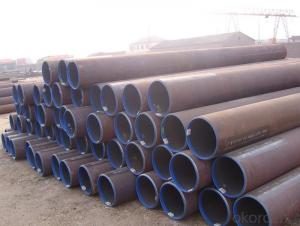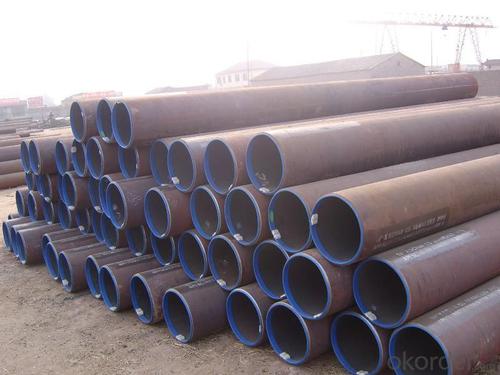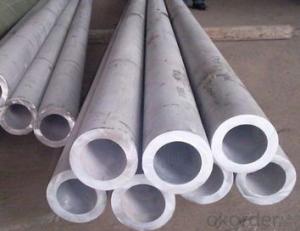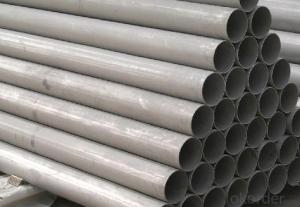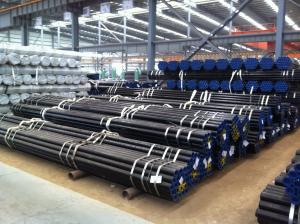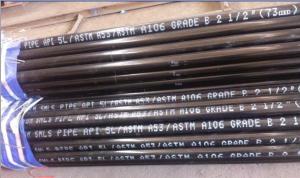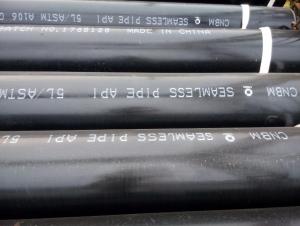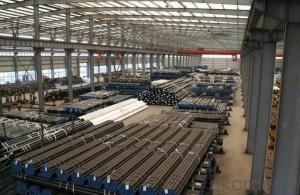Carbon Steel Seamless Pipe API 5L For Oil Usage Application
- Loading Port:
- Tianjin
- Payment Terms:
- TT OR LC
- Min Order Qty:
- 25 m.t.
- Supply Capability:
- 10000 m.t./month
OKorder Service Pledge
OKorder Financial Service
You Might Also Like
Product Description:
1、Structure of Carbon Steel Seamless Pipe API 5L For Oil Usage Application:
Seamless pipe is formed by drawing a solid billet over a piercing rod to create the hollow shell. As the manufacturing process does not include any welding, seamless pipes are perceived to be stronger and more reliable. Historically seamless pipe was regarded as withstanding pressure better than other types, and was often more easily available than welded pipe.
2、Main Features of Carbon Steel Seamless Pipe API 5L For Oil Usage Application:
• High manufacturing accuracy
• High strength
• Small inertia resistance
• Strong heat dissipation ability
• Good visual effect
• Reasonable price
3、Carbon Steel Seamless Pipe API 5L For Oil Usage Application Images:
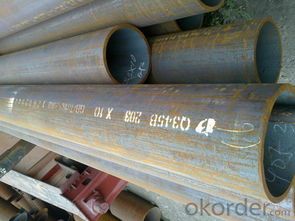
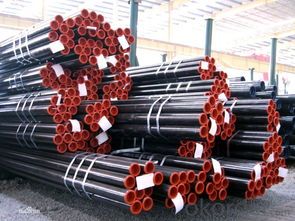
Packaging & Delivery
Packaging Details: | seaworthy package,bundles wrapped with strong steel strip |
Delivery Detail: | 15-30days after received 30%TT |
4、Carbon Steel Seamless Pipe API 5L For Oil Usage Application Specification:
Standard | GB, DIN, ASTM |
Grade | 10#-45#, 16Mn |
Thickness | 8 - 33 mm |
Section Shape | Round |
Outer Diameter | 133 - 219 mm |
Place of Origin | Shandong, China (Mainland) |
Secondary Or Not | Non-secondary |
Application | Hydraulic Pipe |
Technique | Cold Drawn |
Certification | API |
Surface Treatment | factory state or painted black |
Special Pipe | API Pipe |
Alloy Or Not | Non-alloy |
Length | 5-12M |
Outer Diameter | 21.3-610mm |
Grade | 20#, 45#, Q345, API J55, API K55, API L80, API N80, API P110, A53B |
Standard | ASME, ASTM |
1.Material:20#(ASTM A 106/A53 GRB.API5LGRB,GB),45#,16Mn,10#.
2.Specification range:OD:21.3-610mm,WT:6-70mm,length:6-12m or according to the requirement of clients.
3.Excutive standards:GB,ASME API5L.ASTM A 106/A53,Despite of the above standards,we can also supply seamless steel pipe with standard of DIN,JIS,and so on,and also develop new products according to the requirements of our clients!
4.Surface:black lacquered,varnish coating or galvanized.
5.Ends:Beveled or square cut,plastic capped,painted.
6.Packing:bundles wrapped with strong steel strip,seaworthy packing.
5、FAQ of Carbon Steel Seamless Pipe API 5L For Oil Usage Application:
①How is the quality of your products?
Our products are manufactured strictly according to national and internaional standard, and we take a test
on every pipe before delivered out. If you want see our quality certifications and all kinds of testing report, please just ask us for it.
Guaranteed: If products’ quality don’t accord to discription as we give or the promise before you place order, we promise 100% refund.
②How about price?
Yes, we are factory and be able to give you lowest price below market one, and we have a policy that “ for saving time and absolutely honest business attitude, we quote as lowest as possible for any customer, and discount can be given according to quantity”,if you like bargain and factory price is not low enough as you think, just don’t waste your time.Please trust the quotation we would give you, it is professional one.
③Why should you chose us?
Chose happens because of quality, then price, We can give you both.Additionally, we can also offer professional products inquiry, products knowledge train(for agents), smooth goods delivery, exellent customer solution proposals.Our service formula: good quality+good price+good service=customer’s trust
SGS test is available, customer inspection before shipping is welcome, third party inspection is no problem.
Any question, pls feel free to contact us !
- Q: What is the outer diameter and wall thickness of the welded steel pipe of national standard DN250?
- DN250 is the nominal diameter, the outer diameter of the steel pipe is 273mm, the thickness is above 6.5mm.
- Q: What is the typical length of a steel pipe?
- The typical length of a steel pipe can vary depending on its purpose and application. However, standard lengths for steel pipes often range from 20 feet to 40 feet.
- Q: How can galvanized steel tubes be painted on the surface?
- Galvanized parts are nonferrous metals, ferrous metals are black, all metal adhesion is poor;
- Q: Can steel pipes be used for geothermal applications?
- Yes, steel pipes can be used for geothermal applications.
- Q: Can steel pipes be used for electrical conduit systems?
- Yes, steel pipes can be used for electrical conduit systems. Steel pipes are a popular choice for electrical conduit systems due to their durability and strength. They are capable of providing protection to electrical wires and cables from physical damage, moisture, and other environmental factors. Steel pipes also have high resistance to fire, making them suitable for installations in buildings where fire safety is a concern. However, it is important to note that steel pipes may require proper grounding to prevent electrical shocks and should comply with local building and electrical codes.
- Q: Can steel pipes be used for fire protection systems?
- Yes, steel pipes can be used for fire protection systems. Steel pipes are commonly used in fire sprinkler systems because they have high strength and durability, making them suitable for carrying pressurized water to extinguish fires. Steel pipes also have fire-resistant properties, which further enhances their suitability for fire protection systems.
- Q: How are steel pipes used in underground drainage systems?
- Steel pipes are commonly used in underground drainage systems due to their durability and strength. They are used to transport wastewater, stormwater, and other liquids away from buildings and infrastructure to a designated discharge point. The steel pipes provide a reliable and long-lasting solution, ensuring the efficient flow of water and preventing any potential leaks or damage to the surrounding environment.
- Q: How are steel pipes used in the food and beverage industry?
- Steel pipes are commonly used in the food and beverage industry for various applications including transporting water, steam, gases, and other liquids. They are preferred due to their durability, strength, and resistance to corrosion, ensuring the safety and hygiene of food and beverage products. These pipes are used in processes such as conveying ingredients, transferring liquids and gases during production, and supplying utilities like water and steam for cleaning and sterilization purposes.
- Q: What are the different types of steel pipe connections for fire sprinkler systems?
- There are several types of steel pipe connections used in fire sprinkler systems including threaded connections, grooved connections, flanged connections, and welded connections.
- Q: How are steel pipes protected against electromagnetic interference?
- Steel pipes can be protected against electromagnetic interference by applying a layer of insulating material around the pipes or by utilizing electromagnetic shielding techniques such as wrapping the pipes with conductive materials. Additionally, grounding the pipes and implementing proper grounding practices can help minimize the impact of electromagnetic interference.
Send your message to us
Carbon Steel Seamless Pipe API 5L For Oil Usage Application
- Loading Port:
- Tianjin
- Payment Terms:
- TT OR LC
- Min Order Qty:
- 25 m.t.
- Supply Capability:
- 10000 m.t./month
OKorder Service Pledge
OKorder Financial Service
Similar products
Hot products
Hot Searches
Related keywords
